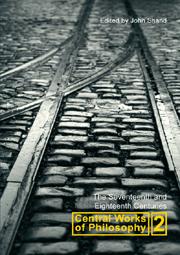Book contents
- Frontmatter
- Contents
- Contributors
- Preface
- Seventeenth- and Eighteenth-Century Philosophy: Introduction
- 1 René Descartes: Meditations on First Philosophy
- 2 Baruch Spinoza: Ethics
- 3 G. W. Leibniz: Monadology
- 4 Thomas Hobbes: Leviathan
- 5 John Locke: An Essay concerning Human Understanding
- 6 George Berkeley: A Treatise Concerning the Principles of Human Knowledge
- 7 David Hume: A Treatise of Human Nature
- 8 Jean-Jacques Rousseau: The Social Contract
- Index
6 - George Berkeley: A Treatise Concerning the Principles of Human Knowledge
- Frontmatter
- Contents
- Contributors
- Preface
- Seventeenth- and Eighteenth-Century Philosophy: Introduction
- 1 René Descartes: Meditations on First Philosophy
- 2 Baruch Spinoza: Ethics
- 3 G. W. Leibniz: Monadology
- 4 Thomas Hobbes: Leviathan
- 5 John Locke: An Essay concerning Human Understanding
- 6 George Berkeley: A Treatise Concerning the Principles of Human Knowledge
- 7 David Hume: A Treatise of Human Nature
- 8 Jean-Jacques Rousseau: The Social Contract
- Index
Summary
George Berkeley published the Principles of Human Knowledge Part 1 in 1710, when he was just 25 years old. He never published the projected Part 2, on free will and the self, claiming to have lost the manuscript while travelling in Italy. Part 1, now known simply as the Principles, defends the apparently shocking thesis that there is no material world; all that exists are immaterial minds and the ideas that are their objects of consciousness. At the stroke of a pen, this bold move did away with all the problems that had beset the materialist philosophies dominant during the seventeenth century. Few philosophers of the period denied the immateriality of the mind (Hobbes did, and Locke was accused of doing so), but all agreed that the external, non-mental world consisted of inanimate matter governed by mechanical principles of motion. Such a mechanism seemed unavoidable given the scientific discoveries of the time, but it faced two major problems. One was the interaction between mind and matter, a problem that had plagued Descartes. The other was scepticism: either we could not know what the external world was like, because all we perceived were ideas, or if we had some other route to knowledge, be it scientific induction or rational intuition, it revealed to us that the world was very different from what our perceptual experiences had led us to believe.
- Type
- Chapter
- Information
- Central Works of Philosophy , pp. 137 - 166Publisher: Acumen PublishingPrint publication year: 2005



